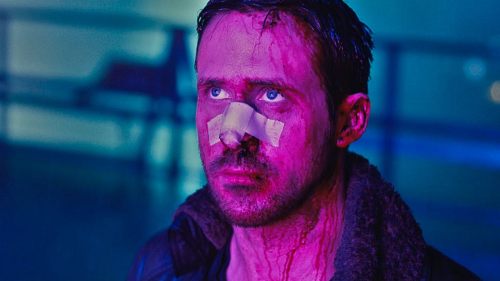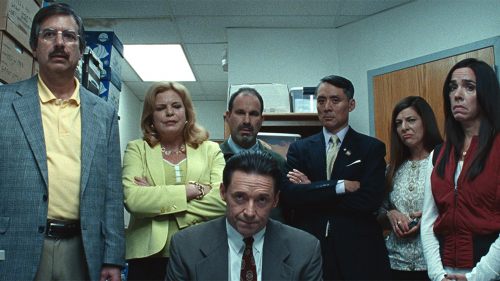Cory Finley Talks THOROUGHBREDS And The Heightened Teen Psyche
Thoroughbreds is out soon. Get your tickets here!
Being rich and beautiful can be killer. Just ask Amanda (Olivia Cooke) and Lily (Anya Taylor-Joy), two estranged friends reunited by tutoring and unified by a shared distaste for authority figures. When left to their devices, they have no choice but to extinguish the source of their boredom – Amanda’s tyrannical stepfather, Mark. As time passes and the bond between the two girls strengthens, so, too, does their desire for debauchery and the need to take action. With the help of a local hustler, the ladies play at being bad guys, and quickly realize the force of their combined destructive nature.
I was lucky enough to sit down and talk with director Cory Finley about his incredibly impressive directorial debut, Thoroughbreds a few days ago in Los Angeles. During our chat, we discussed the depiction of mentally disturbed young people on film, the influence of old black and white movies on his shiny new 2018 project, and what exactly is it is about this modern day Heathers riff that makes it stand out from the crowd.
First of all, I just want to say how refreshing it is to watch a thriller led by women where the plot doesn’t revolve around pregnancy or motherhood, so thank you.
Oh, good! Yeah, I guess those are common themes of female-led thrillers.
Originally, you intended this story to be a play, so what made you decide to convert the project into a film?
I think it was a bunch of things. On a simplest level, late in the writing process, it started feeling more and more like a thriller, and I think it’s very hard to do thrillers on stage. I’ve seen it done, it can be done, but I kept wanting to move the camera away from this one couch, which was like the center of the whole play, and sort of explore the plotting and the mechanics of what these characters were putting together, and it was very hard to do with the set. And then also, just something about it felt more cinematic than theatrical, even in the dialogue-driven scenes, there was something that felt cinematic. I just started seeing them in close-ups and wide shots, and in a cinematic language more than visualizing them on a proscenium stage.
Were you a fan of high school movies, like John Hughes films, while growing up?
To some degree, yes. I mean, I remember watching The Breakfast Club and identifying to a painful degree with a lot of things about that movie. And I did watch Heathers which has been sort of like, our main point of comparison, and the one that I’m flattered by, but I definitely watched a lot of teen movies. This one kind of came to the teen genre through some strange path. It was, in its very first draft, about the parent characters. It was about the older characters in this world, and as I just kept working on it and finding the most interesting way into the themes, it came to rest on the teens in the story.
Do you feel like your work more accurately depicts the teen psyche than some of the other teen movies?
Maybe! I guess it depends on the teen film. Certainly there is a lot just about that teenage alienation and that need to connect – that need to find someone to care about that is certainly heightened more-so in this film than in a John Hughes movie or something like that. But I think they’re, in some ways, about the same.
I’m sure lots of people have linked your film to Heathers, and it definitely has that aspect to it, but it’s also highly stylized and has the cold delivery of classic noirs like Double Indemnity. Aside from Heathers, which films would you say helped influence your project?
Double Indemnity is a very conscious influence; I love that movie. I think the one I watched while I was still writing the play that really influenced the play was the original Postman Always Rings Twice. There was definitely something about, even just the rapid-fire dialogue style of classic film noir that was probably more of a reference than typical teen movies, and just kind of about that murder plot structure. That definitely came more from black and white films than Heathers or something like that.
Thematically speaking, how does the through line of horses, or more specifically, thoroughbreds, impact the overall storytelling?
I think it ultimately, I mean hopefully it has a lot of different resonances, but I think the whole story started with the image of a character deciding to put down a treasured family horse and a character whose parents were reluctant to do that, but she thought it was the morally right thing to do for the horse. I think that, like, I still have some tiny little bit of PTSD from the first time we had to decide to put down a family dog, which I think was my first experience with death, period, as a kid. PTSD is probably a strong word! But certainly, I remember the emotion surrounding that kind of moral decision of, ‘Do we put this animal out of its misery?’ and to me, a horse is just so much of a big, expensive and powerful creature, much more so than a dog, so it just felt like higher stakes to have that conversation. That sort of led to all of the rest of the story.
Amanda is emotionless, as she says, and very logic driven, whereas Lily tends to let her emotions rule her, views the world in a subjective way, and isn’t always able to see the big picture. How does the dynamic between the two girls kind of represent the inner battle most people feel between their head and their heart?
I’m glad you put it that way. I always say, I put a lot of myself into both of those characters, and I think I put two of the things I grapple with the most about my own psyche into the two characters. It’s sort of exactly as you put it -- the numbness of Amanda, or the lack of feeling proper emotions about certain things, and [with Lily,] the lack of ability to put emotions in perspective. I think in a lot of ways, the story is a like a philosophical dialogue between those two, well, I don’t know if you’d call them points of view or emotional mistakes, (laughs) but yeah, I hope that’s what makes it universal. I was interested in how those two tendencies could feed one another.
Visually, you create this beautiful atmosphere with the lavish houses, cars and clothes. How does this clash with the girls’ dark psychology to create this off kilter universe?
I was always very interested in my own messy, complicated feelings about wealth and I think when you’re a beneficiary of wealth, and I remember this from going over to my richest friends’ houses in elementary school, like, when you’re in a really wealthy space, there’s just a lovely softness to everything. You’re sort of totally unaware of money, even though money is surrounding you constantly. There’s such a gentleness to the experience, but then there’s such a violence to the fact of wealth, and wealth is such an expression of hierarchy, an expression of dominance in a way, and that was always an interesting contradiction to me. So I think, surrounding the characters with this very visually splendid and amazing wealthy world felt like a way of putting those themes front and center.
Does the wealth and privilege that these girls experience add or detract to their morality?
Well, it definitely detracts! Maybe it adds in some ways, but detracts definitely. I didn’t want to just simply make a movie about rich girls doing terrible things, but I wanted to think about some of the ways that growing up in wealth and growing up insulated by wealth might kind of stunt these characters morally. I also wanted to be sympathetic to the ways that growing up surrounded by wealth, and surrounded by sort of contemptible people that had that wealth, and provided that wealth for them, trapped them at the same time. But definitely, it’s a story that I think wouldn’t make as much sense if it weren’t set in an over-the-top wealthy world, and is hopefully, trying to say something about that world.
Some would label Amanda a sociopath – were you apprehensive about telling a story that featured young people dealing with what some might perceive as mental illness?
I certainly thought about that, and there’s a line early in the movie where Amanda talks about a shrink that she’s working with, and how the shrink’s just kind of throwing diagnosis at her at random. I think part of [the reason] why I always liked that line was it hopefully let audiences off the hook of having to diagnose that character. I didn’t want to make this a movie that was specifically about people struggling with real mental illnesses. I think those movies exist, and they’re super valuable, and hopefully there is some realism in the way that the movie approaches these characters’ psychologies, but I always felt like I was much more interested in exploring mental illness in the way of like, a King Lear, or a Greek tragedy, or something that like that – something which explores the concept of madness, and these characters that had very odd, out-there psychologies, but that were more ways of exploring some mental questions, rather than ways of talking about the specific struggles of people with a given mental illness.
How does the humor in your movie help balance out those darker elements?
It’s always a push-pull. You want to make the audience uncomfortable in a productive way, you want to put people on edge, but you also want to put people at ease, and I think the ability to laugh is a wonderful way of relieving tension. The movie is aiming for such a constant state of tension that I think it would be almost unbearable without all the laughs. Also, I think some of the darkest things in life are some of the funniest things, and vice-versa, and there’s a wonderful discomfort to that.
I thought it was very touching that you dedicated the film to Anton Yelchin. I only met him briefly once when I interviewed him for Green Room, but he seemed like a very nice person.
I love that movie. I love his performance in that movie. He’s amazing. I feel very lucky that I’m one of the directors that got to work with him. He worked with a really incredible, distinguished line of filmmakers and had such a remarkable career, and was just the absolute best guy on set. Not just sort of a fun guy to spend time with, but a real artist about everything he did, and had such a knowledge of film and such a seriousness about the way he approached what he did, but also such a levity. He’s very much missed. But we all feel very fortunate to have worked with him.



